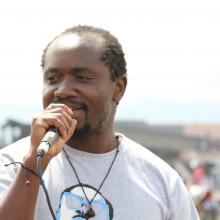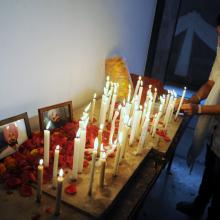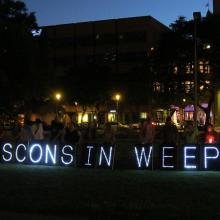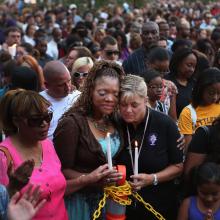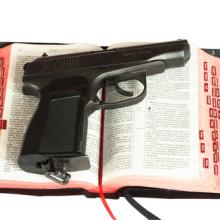Violence
Updated at 11:22: New York City Police Commissioner Raymond Kelly said Jeffrey Johnson, 53, shot and killed a former coworker at Hazan Imports, 41, with a 45-caliber semi-automatic pistol. Johnson had been laid off from the women's apparel company.
Nine other people were wounded or grazed as police exchanged gunfire with the shooter. Mayor Michael Bloomberg said some of the injured may have been victims of accidental police gunfire, and none of them were seriously injured.
"I want to assure people that this had nothing to do with terrorism," Bloomberg said.
Updated at 10:30 a.m.: According to Reuters, two people are dead, including the shooter. At least eight were wounded.
Earlier:
According to the Associated Press, several people have been shot near the Empire State Building in New York City.
From the report:
"City police say three or four civilians have been wounded in the Friday morning shooting and that the shooter is dead. A fire department spokesman says it received a call about the shooting just after at 9 a.m. Friday and that emergency units were on the scene within minutes."
We at Sojourners offer our thoughts and prayers for all those involved in yet another instance of senseless violence.
Physical violence is what happens when the violent force of words is not enough.
It’s possible that we are just beginning to see the start of that in our world today. The words, language, and rhetoric within politics and religion is growing in intensity all the time. Insults, name-calling, and unfounded accusation are normal and even expected.
When one side is called out for their language, they simply excuse themselves, pointing out that their opponent is doing the same thing. So it goes. But what happens when the force of the rhetoric reaches its limit? Violence.
“There is no way to peace along the way to safety. For peace must be dared. It is the great venture.” — German pastor and theologian Dietrich Bonhoeffer (1906-1945)
In Goma, the epicenter of Congo mayhem, where corruption and poverty thrive, Fidel Bafilemba embodies the courage to challenge the norm of his home country.
“That’s me—the disorder of this country, but also the hope for a better future. A hope for an educated people. That’s me. Fidel Bafilemba, activist.”
Working for peace in his hometown has been a journey of transformation—Fidel is a militia member turned peace activist. In the midst of chaos, Fidel manifests hope—a hope for a better future where he, his family, and his community can make self-determined decisions for prosperity and reconciliation.
His struggle is to bring to fruition God’s “kingdom come,” even amid the mayhem of his environment, “for the kingdom of God depends not on talk but on power.” (1 Cor. 4:20).
When others see destruction, poverty, and war, Fidel envisions the future of his people. It is a future of a Congo lush with natural resources and beauty that benefits, rather than destroys, communities. That’s why Fidel refuses to accept impunity and injustice, and seeks to empower others to question and ask, “why?”
“Why don’t we have roads? Why don’t we have education? Why don’t we have, why don’t we have?”
When I was in junior high, I attended a private Christian school where my youth pastor used to show us videos of Christians in public schools being arrested for praying at the flagpole, as well as future Christians being executed because of “liberals who want to take away our right to worship.”
So I get it. When a guy walks up to a conservative Christian organization’s headquarters and starts shooting, it confirms what many people already believe: Evangelical Christians in America are a persecuted minority; and the people behind the persecution are groups like the Southern Poverty Law Center, a group that labels anyone who “takes a stand for Biblical righteousness” a hate group. The storyline would sound reasonable if it weren’t for one small problem: It’s completely ridiculous.

“The practice of peace and reconciliation is one of the most vital and artistic of human actions.” — Vietnamese Buddhist monk Thich Nhat Hanh
How do you combat violence, institutionalized rape, a corrupt government, and years of injustice? With more violence, better weapons, or more strategic strikes?
For Petna Ndaliko, you do it through art. In spite of attempts by the Congolese government and militia groups to silence them, Petna created a stage for local youth to express themselves. They sing about oppression, about corruption, and about the people’s ability to overcome.
Art heals. It unites a community. And it can ignite a spark for change. Film can inspire rape survivors to find their voices and tell their stories. From a grassroots level, music moves people to action.
Petna calls himself a small light from which a huge fire starts growing. For many Christians, this echoes Matthew 5:14, “You are the light of the world. A city built on a hill cannot be hidden.”
Petna’s hope is for the flame to spread through the youth of Congo, to carry the message of hope forward to future generations, finding creative ways to combat injustice.
“Ultimately, we have just one moral duty: to reclaim large areas of peace in ourselves, more and more peace, and to reflect it toward others. And the more peace there is in us, the more peace there will also be in our troubled world.” – Etty Hillesum, Dutch diarist who died at Auschwitz
The social fabric that wove together Amani’s moral values and passion for peace is the target of rebel groups that destabilize and destroy communities. Amani grew up playing football and attending school and church in an area that has been chronically unstable for the past 16 years.
Despite the threat, Amani learned within his local structures the power of community in overcoming insecurity—the hub for gaining moral and intellectual values “to make every effort to come together and live as a community.”
Congo is still suffering from the overspill of the Rwandan genocide, the aftermath of which took the lives of both of Amani’s parents. Rebel groups roam the Kivu provinces of eastern Congo and seek to unravel the very social fabric of Amani’s community.
Taking heart from the moral lessons he gained from playing football with his school and through his education, Amani decided to overcome the insecurity caused but he rebels by bringing people together by providing a peace market—a community nucleus for women, children, and men to gather in a safe, empowered, and peaceful environment to care for one another.
Another senseless act of violence today was targeted at the Family Research Council. A security guard is now in stable condition at a local hospital after being shot in the arm by a 28-year-old assailant. The suspect is now in custody. Multiple outlets are reporting that the young man specifically intended to attack FRC staff because of their conservative advocacy.
My prayers goes out to the security guard and his family as he recovers. His actions may have saved the lives of many. Washington, D.C., Police Chief Cathy Lanier said, “The security guard here is a hero, as far as I’m concerned.”
My heart is with the rest of the FRC staff. Their place of work will not feel safe after this. It will undoubtedly be difficult knowing there are those who would do violence against you because of your convictions.
Updated 5:35: According to KETK in East Texas, the incident occurred as the constable was attempting to serve an eviction notice.
Updated 4:00 p.m.: KBTX in Bryan / College Station, Texas is reporting that the suspect in the shooting has died.
Updated at 3:35 p.m.: Via KBTX in Bryan / College Station, Texas: Brazos County Constable Brian Bachmann of the College Station Police Department has died as a result of injuries sustained in the shooting. A civilian has also been confirmed dead.
College Station Assistant Police Chief Scott McCollum confirmed the casualties in a statement this afternoon. Another member of the police department was shot in the leg and is in stable condition, and a female civilian was also shot and is in surgery, according to McCollum. McCollum said members of the department are still trying to piece together details and a motive for the incident.
While I strongly believe that physical activity and participation within sports can offer excellent avenues for education and wellness on an individual and community level, my role as a fan of sports has been significantly tested over recent years. In other words, I have come to wonder whether or not something inherently good, such as sports, has reached excessive levels to the point of having far too many negative consequences in society. For example, in the U.S. we experience massive inequality and outcry surrounding government budget shortfalls, yet we seem to have more than enough funds for stadiums, tickets, TV packages, and team-related memorabilia. While our public servants receive salary cuts and loss of jobs, millionaire professional athletes argue with billionaire owners over income distribution and so-called “fairness." And of course, while I hear countless people complain about how busy they are and how financial times are tough, those same individuals seem to have plenty of time to watch a few hours of sports on TV each night, and more than enough resources to support their favorite teams. With all of this in mind — and one could list countless more examples — we have to wonder whether our priorities have been distorted, as our collective love for sports may have crossed the line from entertainment to idolatry. Or in other words, how we went from being spectators and participators to devout worshippers.
I wasn’t sure what to expect as we pulled into the parking lot of a local Sikh temple — or gurudwara— last night, but I assumed it would be culturally enlightening and offer a glimpse into a worldview and religious tradition I have only sparingly engaged. While yesterday was the National Day of Remembrance and Solidarity for the victims and mourners of the shooting in Wisconsin, I felt deeply compelled to stand with them in their pain as a follower of the Prince of Peace.
Walking into the gurudwara's courtyard holding my two-year-old daughter’s hand, my wife and two friends were immediately greeted by the priest with a handshake and smile. He thanked us for coming and invited us into the experience that included a short service in the gurudwara and vigil outside to remember the six worshipers who were shot by a man that had never met them. I can only speculate, but if this man would have engaged these people on a relational level at any point, he certainly would have reconsidered his actions.
Much like the response of the Amish after the horrific schoolhouse massacre in 2006, the Sikh community has intentionally chosen to respond to by offering radical love and forgiveness. Although somber, they carried a deep conviction to embrace the way of peace as retaliation for the death of these innocent victims.
From The Los Angeles Times:
Escalating violence in Syria has shut down pharmaceutical plants, piling another worry onto the woes facing the Syrian people: Severe shortages of medicine.
The World Health Organization warned Tuesday that growing clashes between forces loyal to President Bashar Assad and opposition fighters around the cities of Damascus, the capital, and Aleppo have damaged and closed many of the local plants that make the vast majority of medicines. The country produces most of its own pharmaceuticals.
Drugs to treat tuberculosis, hepatitis, diabetes and other maladies are urgently needed, along with chemical reagents to screen blood before it can be used for infusions for trauma and surgery patients, according to reports received by the United Nations agency.
Learn more here
Like most people, I was deeply troubled by news of another mass shooting, this time at a Sikh temple in Oak Creek, Wis., not far from Milwaukee. On the heels of the tragic massacre in Aurora, Colo., this seemed all the more savage to me, given that it took place in a house of worship.
Maybe it’s because my wife and I work in a church and are aware of such vulnerabilities every day, but my first reaction is defensiveness. I want to raise my guard, double-check the locks and do whatever I can to ensure our safety. It’s the response that makes the most sense, after all.
Or is it?
I heard about the shooting at the Sikh temple in the middle of leading worship. It was the same space where two months ago we buried a child killed by gun violence. It was the same space where two weeks ago we prayed for the community of Aurora. And now we were gathered again and like the family of an addict we were left with the pain of a destructive lifestyle.
We wept. We prayed. We sang.
I stood up and said, “We have prayed. And there is power in prayer. Change can happen with prayers. And we pray for brothers and sisters who worship a different God than ours and yet we call them our family. We pray for the shooter because we are taught to pray for our enemies. But prayer is not enough."
Since Sunday's terrible shooting at a Sikh temple outside of Milwaukee, Wis., faith communities have been extending their support, thoughts, and prayers to the faith community.
As Christians, we are called to be a voice for peace and nonviolence — to stand against a culture of violence that has allowed for two such hateful acts in three weeks. We at Sojourners extend our deepest sympathis, our prayers lifted high, for all of those affected by the senseless tragedy.
Lamb of God,
you take away the sins of the world.
Have mercy on us.
Grant us peace.
For the unbearable toil of our sinful world,
we plead for remission.
For the terror of absence from our beloved,
we plead for your comfort.
For the scandalous presence of death in your creation,
we plead for resurrection.
Lamb of God,
you take away the sins of the world.
Have mercy on us.
Grant us peace.
Come, Holy Spirit, and heal all that is broken in our lives, in our streets, and in our world. In the name of the Father, and of the Son, and of the Holy Spirit. Amen.
— from Common Prayer
Please comment here to add your thoughts and prayers.
Does anybody else feel this weight?
I woke up this morning in tears. I don’t know why today is different, but I do know the weight is for my brothers and sisters who are in pain.
I imagined what the night was like for folks in my neighborhood who had to fend off threats last night.
I imagine the young girl in a car — against her will or against her first choice — with the guy named John, and I lament for her soul.
I imagine the young guy standing out all night selling death so he can have a little life — whether it’s in the form of food, dignity or just to feel like he is meeting some need, somehow.
I imagine the mom lying in the bed next to someone she would rather not touch, but because he pays the bills for her kids to eat and sleep, she puts up with his abuse and doesn’t say anything about the other woman he also lies with around the corner.
As a woman preacher, I can’t help but love St. Mary Magdalene. She was the first witness to the resurrection. When I first discerned my call to be a preacher I got a tattoo of her on my forearm – it’s from a rare depiction in ancient Christian art – of her proclaiming the resurrection to the apostles. I felt that when I needed to, I could borrow her strength. And since July 22 is her feast day, we decided weeks ago to ditch the normal Sunday readings and celebrate her as an important saint to us.
But then Friday happened. I was still in New Orleans when I saw the news of the shooting. After praying that you were all safe I soon thought, “we can’t really hold a celebration of a saint today … it just wouldn’t make any sense.”
I had gone to New Orleans with an idea for a sermon on Mary Magdalene – a sermon about who gets to speak in the Bible and who gets to be named and blah, blah, blah.
And just as I was about to ditch it all and go with the regularly assigned reading for today, I went back and again read this story of Mary Magdalene at the tomb and realized, given the violence and terror thrust upon our community this week, that maybe Mary had more to say about it than I could. I decided again to borrow strength and voice from her. So were I a pastor who titled her sermons, this one would be WWMMP – "What Would Mary Magdalen Preach?"
Of all the controversies that have followed in the bloody wake of the July 20 shooting rampage in Aurora, Colo., few have provided such a clarifying insight into the moral tensions and contradictions in American culture than the argument over whether gun control is a religious issue.
The Rev. James Martin, a popular author and Jesuit priest, was among the first to set out the terms of the debate, when he penned a column at America magazine arguing that gun control “is as much of a ‘life issue’ or a ‘pro-life issue’ … as is abortion, euthanasia, or the death penalty (all of which I am against), and programs that provide the poor with the same access to basic human needs as the wealthy.”
Martin’s central point was that abortion opponents spare no effort to try to shut down abortion clinics or to change laws to limit or ban abortions, so clearly believers should be committed to taking practical steps to restrict access to guns.
“Simply praying, ‘God, never let this happen again’ is insufficient for the person who believes that God gave us the intelligence to bring about lasting change,” Martin wrote. “It would be as if one passed a homeless person and said to oneself, ‘God, please help that poor man,’ when all along you could have helped him yourself.”
Faith, for many in eastern Congo, is a source of hope in an environment where optimism is often in short supply. Many Congolese consider faith communities to be among the few trusted institutions in a society (and a government) rife with corruption.
As the situation in eastern Congo has markedly worsened in recent weeks, the church and faith communities have been at the center of efforts to end violence and create space for peace.
Violence has rapidly escalated in eastern Congo since a new rebel movement known as M23 emerged in April. M23 is composed of several hundred Congolese soldiers, loyal to the former Rwandan backed rebel movement — the CNDP — who were subsumed into the Congolese army in 2009 as part of an opaque peace agreement between the rebels and the governments of Congo and Rwanda.
Loving God,
Darkness has covered our nation and thick darkness has descended upon our people. Tragedy has clouded out the light. Shots rang out in Aurora, Colorado. Some people were wounded by gas and bullets. Others were murdered.
In this time of darkness may your resilient light shine forth.
May your light shine on the family and friends of the 12 people who were killed during this senseless crime. There's no way to explain the darkness that indiscriminately murders children, women, and men. They were each someone's son, daughter, mother, or father — and nobody can fully understand the immense grief and righteous anger of their loved ones. They need your light, Loving God. Please pour it forth....
Love, we read over and over in the Bible, casts out fear.
The angels to Mary: Do not be afraid. To the shepherds: Do not be afraid. Do a search on that phrase and you’ll find it numerous times from 2 Kings through Revelation. When he appears to humans, our God of love is always prefacing his messages with, “Do not be afraid.”
As a mother, I want to raise brave kids who hear that message and know it to their toes. Everything is going to be all right. Love wins, as they say.
I want them to be people who know that there is a bigger picture, a spiritual promise of hope and redemptive, even when life circumstances feel frightening.
I don’t want them to lose sight of it or fail to see God’s gifts of love around them because they are afraid of what, ultimately, cannot harm them.
It’s not always easy, however, for me to be brave.



